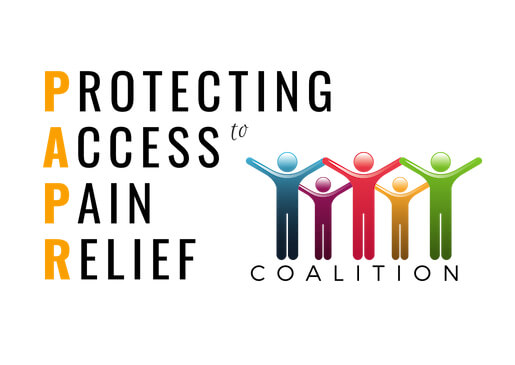Washington, DC (July 22, 2015) – Today, the Protecting Access to Pain Relief (PAPR) Coalition officially launched to help ensure that American consumers continue to have access to, and choice of, safe and effective pain relief that is best suited to manage their condition. Founded by advocates for pain relief, the PAPR Coalition includes multiple stakeholder groups representing public health organizations, medical professionals, consumers living with pain and concerned citizens, who will work collaboratively with the U.S. Food and Drug Administration (FDA), members of Congress, healthcare providers, and stakeholders to ensure Americans have access to safe and trusted pain relief, including those containing acetaminophen. PAPR also advocates for education of consumers and healthcare professionals about the appropriate use of prescription and over the counter (OTC) medicines.
“For the more than 100 million Americans living with persistent pain, such as pain caused by disease or other health issues, protecting access to safe and effective pain relief is a top priority,” said Paul T. Conway, President of the American Association of Kidney Patients and chair of the PAPR Coalition steering committee. “While protecting access to pain relief is important to all Americans, it is particularly important to the 53% who depend on acetaminophen because their age and/or health conditions put them at increased risk of adverse events from alternative forms of pain relief.”
The FDA may be considering regulatory changes that would restrict access to OTC doses of acetaminophen over 325 mg (maximum single dose of 650 mg). If implemented, this policy could cause consumers to switch to other pain medicines to achieve the equivalent relief . Since not all pain medicines are appropriate for millions of Americans living in pain, switching could lead to an increase in adverse events, higher healthcare utilization costs, and other unintended public health and economic consequences.
“The Protecting Access to Pain Relief Coalition has come together at a critical time, when Americans are being encouraged to take an active role in their own healthcare. This coalition helps to ensure that access to the pain relief these patients currently rely upon, and in many cases the only pain relief they can take based on their health conditions, remain available as over the counter options.” said Mr. Conway, who previously served as Chief of Staff of the United States Department of Labor and Deputy Secretary of Health and Human Resources for the Commonwealth of Virginia.
The PAPR Coalition believes consumers should be able to make their own healthcare decisions and should have access to all safe OTC pain relief options. In addition, education of consumers and healthcare providers plays a critical role in helping patients understand the safe and proper use of acetaminophen. According to a recent survey conducted by the Alliance for Aging Research, Americans favor education about the safe use of acetaminophen, and disagree with restricting access to those same OTC medicines as the alternative. “Older adults in the US experience pain on a regular basis and many of these seniors rely on OTC pain relievers that contain acetaminophen to manage their pain and maintain their quality of life,” said Cynthia Bens, vice president of Public Policy for the Alliance for Aging Research and vice president of the PAPR Coalition steering committee. “A survey commissioned by the Alliance for Aging Research revealed that only 16% of Americans believe that it is a good idea for the FDA to implement policies that would limit access to OTC pain medicines containing acetaminophen.”
When used as directed, acetaminophen has one of the most favorable safety profiles among OTC pain relievers. The safety and efficacy of various doses of acetaminophen, including 500 mg, 650 mg and 1,000 mg, have been well-established in clinical trials and clinical use. The availability of a full range of OTC doses of acetaminophen is important to help consumers manage their pain, while minimizing the risk of potential unintended consequences from restrictive policies.
About the PAPR Coalition
The PAPR Coalition is committed to working collaboratively with the FDA and other stakeholders to ensure that consumers continue to have access to and choice of safe and effective pain relief that is best suited to manage their condition, while educating consumers and healthcare professionals about the appropriate use of prescription and OTC medicines, particularly those containing acetaminophen. The PAPR Coalition is made up of the following organizations — Alliance for Aging Research, American Association of Colleges of Pharmacy, American Association of Kidney Patients, American College of Preventive Medicine, American Pharmacist Association, National Council on Patient Information and Education, Society for Women’s Health Research, The Gerontological Society of America and the US Pain Foundation.
For more information about the PAPR Coalition, please visit www.paprcoalition.com and follow us on Facebook and Twitter (@paprcoalition).
***
Media Contact:
Stewart Gordon
202-469-5196
media@paprcoalition.com
There are variant cases such as bipolar upset which have no cure. Naturally, about 35% of Americans order medications online. For example you can purchase penicillin antibiotics that fights bacteria. This type of medications will not treat several infection such as the common cold. Do you know what Levitra is? Levitra is a remedy used to treat a lot of diseases. What do you already know about buy cheap levitra? Probably each adult has heard about generic levitra online. Variant companies describe it as online levitra. Albeit erectile disfunction is more common in men over sixty, men of any age can unable to have an erection. Low interest in sex isn’t the same as impotency, but numerous the same aspects that stifle an erection can also dampen your libido. Prescription medicaments can save lives, but they can also come with dangerous side effects. It’s vital to mind that not all drugs are good for your. Along with them helpful effects, most medicines, however, have unwanted aftereffects although as a rule not everyone experiences them. Store the medicaments away from excess heat. For example the liquid medications usually have to be kept in the cooler, but other may be stored at room temperature.


